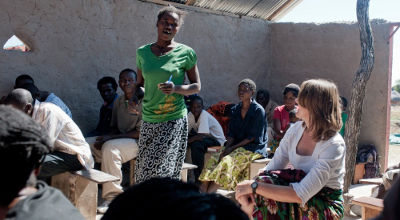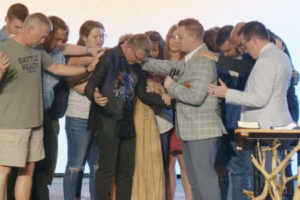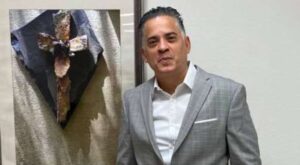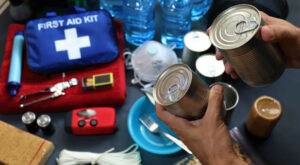In the hot, dusty town, four small churches gathered in a half-built structure of mud and steel panels to encourage each other with a weekend of storytelling. Members squished together on tree branches and two-by-fours, trying to take advantage of the square of shade provided by a tarp stretched across the open rafters. Cheering rang through the building as listeners acknowledged the progress made in learning new Bible stories.
The concept of Bible storying was introduced to the churches by Southern Baptist missionaries Jeff and Staci Powers. Most of the Zambians in this area are nonreading oral learners, so the idea of receiving the Bible in story form, rather than through sermons, is very appealing to them. Each of the four churches participate in story-based Bible studies with Jeff, and they like storying so much they made it the focus of their joint annual fellowship.
Abigail Musonda, a young teacher, said Bible stories have had a powerful impact in her community.
“There are many good examples. That woman in the black hat, she cannot read,” said Musonda, gesturing toward an older woman laughing with some friends on a bench. “But when she [hears] the stories she is able to [remember] them, and she even accepted Christ.”
Musonda was excited to point out that people like that woman, who learn the Bible orally, are able to nurture a strong relationship with God.
Roughly 5.7 billion people—over 80 percent of the world’s population—live primarily by orality because they are nonreaders, estimates Grant Lovejoy, director of oral strategies for IMB. These people, like Musonda’s friend, cannot understand the Gospel through traditional methods such as Bible reading, lectures or tracts.
Throughout his 10 years serving as a church planter, Jeff Powers has been learning how to communicate the gospel with oral learners in Africa.
“It goes deeper than just hearing versus reading,” he explained. “It gets down to how people learn and how people think—how they store information. Literate people store information in books or any kind of literature. An oral person will store their information in songs, poetry, dramas or stories.”
Oral learners get their information from sources close to real-life experiences. They process information by applying it to their own world or their own life—with a concrete, functional logic.
Literate learners are often from advanced and highly-educated societies. They learn well from books and can absorb continuous prose easily. They are usually separated from what they are learning and think with abstract, linear logic.
In the past missionaries struggled to teach people to read so they could gain access to God’s written Word. Recently missionaries have discovered that to comprehend written literature, oral people have to know not only how to read but also how to think in a literate way.
Powers, along with many other missionaries, has been using storying as a way to meet oral learners where they are right from the beginning.
Storying involves taking parables and stories from the Bible and retelling them orally—much like people retell events from their own lives.
When oral learners hear Bible stories, they hear real-life examples that can be applied to their own lives. The stories are rooted in human experience, so they speak to the learner in a way that a lecture or sermon does not.
When missionaries teach stories, they often ask the students to repeat the stories back in several different ways. For example, the story can be repeated first by one person or as a group, then the story can be acted out, put into music or even made into art. Their goal is to encourage as many paths of absorption as possible.
Powers regularly meets with four Zambian church groups that have been learning Bible stories orally since 2010.
“We go through a process where we tell the story, review the story, do a drama of the story and ask questions about the story in an effort to teach people how to think through Scripture—what you might call self-theologizing,” said Powers.
Often, hearing the stories allows people to truly grasp the Gospel for the first time.
Pythias Ngwila is working with Powers to teach the stories to the community in Namwala.
“It is different because at times I can read and I understand but I forget,” shared Ngwila. “Now this method—when Jeff tells a story—I think I cannot forget.”
But for Powers the goal is more than mere comprehension. As he teaches the stories, he is also teaching a critical style of thinking that helps people find life application from the stories.
By doing this Powers hopes to remove any reliance on missionaries or trained pastors and give people the tools to develop a Christian response to situations, rather than returning to cultural religions or traditions.
Storying allows oral cultures to store biblical knowledge in the same way they store historical or practical information. Thus they can access Bible truths in the same way their mind accesses most other forms of knowledge. Through practiced discussion of the stories people can train themselves to use their Bible knowledge in everyday life.
Community-based living, which is often found in oral cultures, multiplies the effectiveness of the storying method. A person is not limited by the amount of stories he or she can remember. Instead a small group of people can maintain and access hundreds of stories.
But storying is not only relevant in developing or rural communities. Oral learning is becoming more and more the preferred learning style in developed countries as well. Every person begins life as an oral learner, and many people choose to learn through oral media on the Internet or the television more often than through literate sources. This was made evident by the U.S. Department of Education when they researched 18,500 people in 2003 and determined that less than half of all Americans can handle “continuous prose.” It has been estimated that the Bible is 75 percent continuous prose.
Jesus used parables to explain truth, and in the same way modern-day Christians should “speak the word to them as they [are] able to hear it” (Mark 4:33), says Lovejoy.
“Ministries who adjust their approach to the literacy level of their group, can expect improved communication, more learning, and more life change among the hearers,” Lovejoy claims.
The Powers’ next step is to train many believers to be leaders and disciplers using this oral storying method. They are thinking and praying about opening an oral Bible school for Christian leaders so they can spread out and begin teaching with this method all over Zambia.
- Pray for the Powers as they decide whether or not to open an oral Bible school.
- Pray for the oral people groups in remote areas who have yet to be reached with the Gospel.
- Pray for the four Zambian churches involved in the storying project, that they would benefit greatly from a strong understanding of God’s Word and would be able to share their knowledge with others.
See an error in this article?
To contact us or to submit an article





















